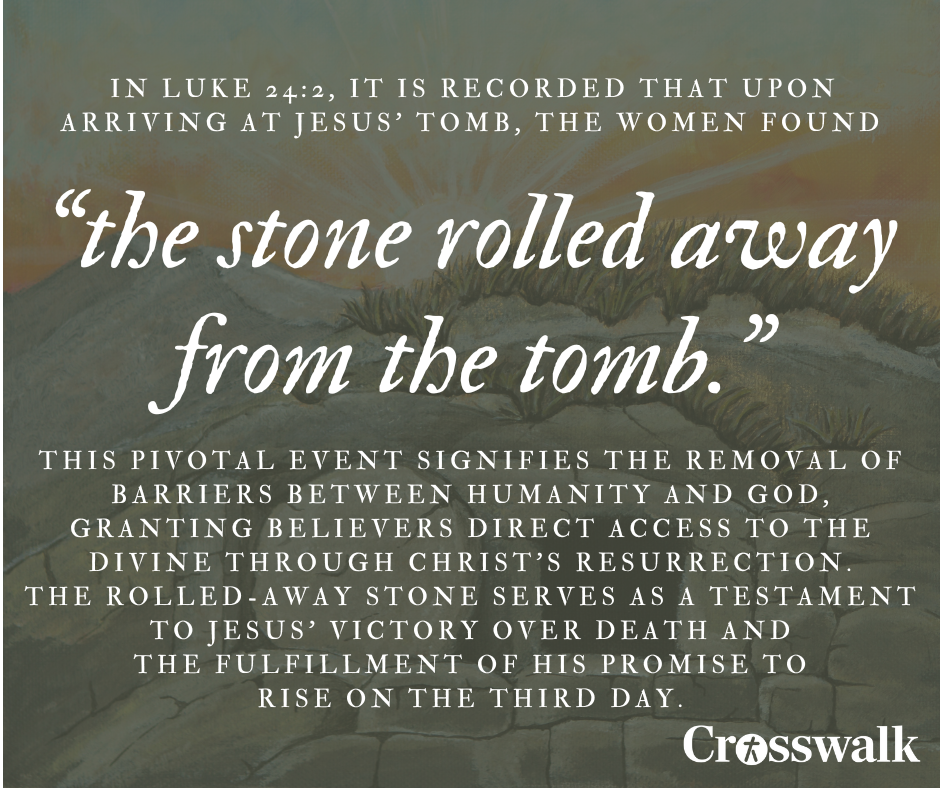Why Is it So Important that the Stone Rolled Away?

The rugged beauty of the Colorado Rockies draws tourists from around the world, but occasionally rockslides shut down traffic for hours or days at a time. Massive boulders eliminate travel to some of the most well-known areas of the state. Only a crew equipped to remove the rubble can provide locals and tourists the access they need.
Scripture reveals that following Christ’s death, a large stone kept the disciples’ from approaching Jesus. Experts estimate it may have weighed as much as two tons. Not only that, but the rock was tethered to the limestone cavern with a strong rope and sealed with wax or clay.
Despite the obstacle, Mary Magdalene, the other Mary, Joanna, and several other women (Matthew 28:1, Mark 16:1, Luke 24:1, 10, John 20:1) rushed to the gravesite hoping to embalm Christ’s body. Unlike most, these women had remained faithful—even following Jesus to the cross. They had experienced healings and witnessed miracles. Perhaps God would provide another miracle and allow them access to Jesus’ body.
Like the stone lodged in the mouth of the sepulcher, the women had created a human-made stone—one of doubt and disbelief. As much as they loved Jesus, they neither understood nor believed He would be resurrected. Those who were willing to lose their lives for the man they loved mourned without hope.
When they arrived in the garden that morning, an earthquake suddenly rattled the soil as an angel flung the rock from the mouth of the grave. Tears of grief turned to tears of joy. Hadn’t they been asking, “Who will roll the stone away?” (Mark 16:3).
The Greek word used for “rolled away” is apokulio and it has the idea of force behind it. Research into first-century Jerusalem indicates that a rock used for a wealthy man’s tomb like the one in which Jesus was laid (Matthew 27:57-61) would typically be situated in an incline to prevent grave robbers and animals from violating the gravesite. But an equipped, powerful angel of God removed the stone and invite the women to notice its emptiness. In the same way, only Christ could provide sinful people the access we need to a holy God.
The moment the stone rolled away, Mary and the others realized they 1) had hope through eternal admittance to Christ and 2) incredible perspective on the power of the risen Lord.

What Is the Meaning of ‘The Stone Was Rolled Away’?
Stones are significant throughout the Bible. Jesus quoted the Old Testament while speaking with the Pharisees when He said, “The stone which the builders rejected has become the chief cornerstone” (Matthew 21:42 NKJV). The word used for stone in this passage, lithon, is the same as the one used in Matthew 28:2 which reads, “…an angel of the Lord descended from heaven, and came and rolled back the stone…” (NKJV).
A cornerstone is the foundational piece of a stone building. Every other rock laid upon the cornerstone depends upon its stability and strength. Without a firm, reliable cornerstone, the entire building will collapse.
But because Christ is faithful (2 Timothy 2:13), the promise of eternal life was resurrected in those who had believed and those who would believe. The Cornerstone rolled away, or cast off, every hindrance of sin that we might have life. Once we invite Christ to be the Lord of our lives, there is nothing we can do that will separate us from His love. Our foundation is secure.
Jesus ensured that the sins, or stones, that separated us from God were permanently removed when He rose again.
Why Did They Place it in Front of Jesus’ Tomb?
Although some tombs owned by the wealthy had a stone rolled in front of the entry, few were given the same level of attention as Jesus’ grave. Why would anyone go to such lengths to bury a man who had died a criminal’s death?
Because the Pharisees and chief priests were jealous of the influence Jesus had over people, they falsified charges against Him. While Jesus held to the patterns of His faith, He was radically different and men, women, and children were drawn to His selfless acts of mercy and love. At the same time, Christ challenged the Pharisees and the traditions and laws they wielded like a weapon—confronting their hypocrisy.
The Jewish religious leaders feared His disciples would attempt to rescue Christ’s body and convince people He was alive. Hoping to avoid insurrection, they approached Pilate who supplied a guard—which consisted of about 50 Roman soldiers as well as temple guards.
The tomb was fortified. The perimeter and surrounding area protected. The reputation of the devout guaranteed—until one of God’s enlisted, an angel, engaged in defense of heaven’s King and thrust the stone from its place in order that Christ might take His.
What Happened to the Guards in Front of the Tomb?
Imagine you are a Roman guard accustomed to combat. Confident and adept, you are skilled with weaponry. As dawn breaks, you’re startled by an abrupt windstorm accompanied by a powerful earthquake. You have never experienced anything like it. Your heart rate finally begins to slow when suddenly, a man whose face is “like lightning and…his clothing as white as snow” (Matthew 28:3 NKJV) stands in front of you. But neither war nor death has prepared you for such holiness and you “shake in fear and become like a dead man” (Matthew 28:4 NKJV). How would you explain this strange phenomenon and the disappearance of a man who was confirmed dead by multiple credible witnesses?
Perhaps you would be gripped by embarrassment. The Greek word used for shook means “to throw into a tremor.” Battle-hardened soldiers, struck with terror, were quaking in their sandals and then paralyzed by fear. By the time the women arrived, the guards had fled.
Because it would have been a capital punishment for a Roman soldier to allow Jesus to “escape” the tomb, the soldiers approached the chief priests for a solution. They agreed to implicate Christ’s disciples rather than admit He had been resurrected for a price. In exchange, their lives were spared (Acts 12:18-19, Matthew 28:13-14).
Why Is It So Important That the Stone Rolled Away?
If the stone hadn’t rolled away, Jesus would be like any other religious leader. He might be considered moral or loving, but Jesus would not have changed the direction of humanity, and He would not be God.
Instead, Jesus conquered sin and death. He proved that He is the Son of God, the King of Kings, and the Lord of Lords. He appeared to hundreds of people following His resurrection and infused a cowardly cohort of fearful disciples with radical faith—enough faith that all of them willingly suffered persecution and spearheaded the growth of what would become Christianity.
Because the stone rolled away, people have hope. There is nothing that keeps them from seeking a relationship with God. The sin that blocked the path has been removed and all that remains is for man, woman, or child to confess that Jesus is Lord (Romans 10:9-10).
When he or she does, eternity is secured. Jesus said, “My Father's house has many rooms; if that were not so, would I have told you that I am going there to prepare a place for you?” The grave could not hold Christ; we can trust He is preparing a glorious future for those who seek after Him.
Some experience terrible storms before they realize their need for Jesus while others come to Him easily, but we all have complete access to the Father because the stone was rolled away.
Further Reading
What Is the Significance of ‘They Found the Stone Rolled Away from the Tomb’?
Why Is it So Incredible That the Stone Was Rolled Away?
Photo credit: ©GettyImages/alessandrophoto

This article is part of our larger Holy Week and Easter resource library centered around the events leading up to the death and resurrection of Jesus Christ. We hope these articles help you understand the meaning and story behind important Christian holidays and dates and encourage you as you take time to reflect on all that God has done for us through his son Jesus Christ!
What is Lent? It's Meaning and Why We Celebrate
When is Lent? When Does Lent Start and End?
What is the Meaning Ash Wednesday?
What is Holy Week?
What Is the Meaning of Palm Sunday?
What is the Meaning of Holy Monday?
What is Maundy Thursday?
What Is Good Friday and Why is it Good?
Good Friday Prayer
What Does Holy Saturday Mean?
What Is the Easter?
Easter Prayers
Powerful Facts About the Cross of Jesus
Originally published March 15, 2021.







